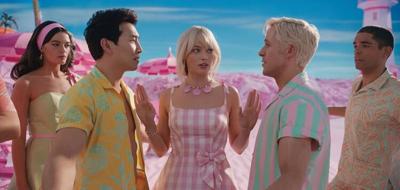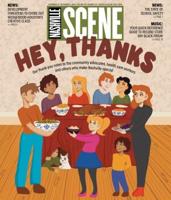
'Barbie'
Cue the discourse about one of the most hotly anticipated movies of summer. Directed by Greta Gerwig, with a screenplay co-written by her and Noah Baumbach, Barbie is a film that will read differently depending on your childhood and generation. The Mattel character has evolved from glamour girl to sweetheart to mom-to-be to physicist, aiming to be more inclusive with every decade. Despite the massive promotional campaign for the film, previews of Barbie give little away. It’s visually sublime, damn funny and quick-witted. And it might just change the way viewers see the icon — and themselves.
Barbie opens her eyes in her DreamHouse to a track named for Barbie’s favorite color. The opening bars sound like Madonna’s “Holiday” but are soon unmistakably Lizzo. That’s the vibe: something old, something new, something borrowed and something “Pink! Goes with everything!” Unlike President Barbie (Issa Rae), Lawyer Barbie (Sharon Rooney) or Doctor Barbie (Hari Nef), Margot Robbie plays Stereotypical Barbie — the blond bombshell who doesn’t have a job. Her purpose is to be perfect. When she slips off her high-heeled slippers, her feet stay posed on tip-toes, just like the plastic doll’s. As she waves good morning to the other Barbies and Barbiverse friends, her wrist is bent like those of pageant queens.
Robbie gets that frozen smile just right — she glows without warmth. Production designer Sarah Greenwood has pulled out all the stops in this eye-popping pastel Candy Land, and costume designer Jacqueline Durran creates a whole sweet shop full of confectionary couture. In Barbie Land, artificiality is the entire point.
Speaking of sweets, the Kens are eye-candy — superfluous beach bums with no narrative arc outside of the occasional “beach off,” when they compete to prove who is the most beachy. Stereotypical Ken — Stereotypical Barbie’s counterpart — is played by MILF Ryan Gosling, the Mouseketeer I’d Like to Fuck. As Ken, Gosling has never been more fun. Platinum blond, his muscular chest shining with tanning oil, Ken’s only aspiration is to bask in Barbie’s glow — and maybe get to first base. But beneath that self-effacing smile, Ken longs for a deeper connection to the woman for whom every night is girls night. Why must he live “a life of blond fragility?” he sings in the film’s Ken-etic musical number. Will Barbie ever “see the man behind the tan?”
Outlook not so good. Girls run the world in Barbie Land. Sisterhood is everything, and the Barbies assume that our world (“Reality”) has followed suit. With their creation, they think, Mattel made women the more powerful sex. (Gender is binary in Barbie, although an argument could be made that Michael Cera’s underappreciated Allan is genderqueer.) If a Barbie can be anything, so can a girl. What’s more feminist than that? The myth is delivered with a wink and a nudge that we know will be addressed by the film’s end — and it should disabuse you of any notion that Barbie will be as easy as a light beach breeze.
When Stereotypical Barbie experiences sudden pangs of existential dread, her life and Barbie Land are upended. On a visit to Weird Barbie (SNL’s singular Kate McKinnon — a riot here), Stereotypical learns she must embark upon the journey to Reality to find a little girl who is in crisis. Only this can return her psyche back to perfect, ignorant bliss. Calamities ensue, but she manages to find the mother-daughter team at the heart of it all to set the world right. Mom Gloria (America Ferrera) and tween Sasha (Ariana Greenblatt) are at odds, and Barbie herself embodies their conflict. Meanwhile, Ken learns about a little thing called patriarchy, and Barbie’s bubble officially bursts.
Scene staffers Hannah Herner and Kelsey Beyeler talk 'Barbie'
Warner Bros. has been pumping us up for hot Barbie summer for a year now with an increasingly intense marketing campaign. Cineplexes are equipped with human-sized Barbie boxes for posing in — and for free publicity when you post #BarbieStyle. The campaign and its ripple effect have included everything from a selfie generator to a Barbie Xbox console, a Barbie/Ruggable collaboration and the “Barbie World” remix by Nicki Minaj and Ice Spice. (“It’s Barbie, bitch, if you still in doubt.”) In addition to Lizzo and Minaj, the soundtrack includes tracks by Billie Eilish, Khalid and Dua Lipa. And we can’t leave out the Barbenheimer memes — folks are pledging to make summer’s most anticipated and polarized flicks a double feature this weekend.
My mother had the first Barbie ever created — statuesque in a black-and-white striped swimsuit, black pumps, a sleek ponytail and curly bangs. Sixty-four years and more than a billion Barbies later, I wonder, Who has pin-straight hair and curly bangs? Did my 8-year-old mother consider this improbability back in 1959? It’s the first of many impossible traits Barbie and Mattel have peddled as being perfectly natural. Those of us who live in the messy place called reality are stuck straightening half our hair and curling the rest.
My Barbies didn’t spend a lot of time wearing their prissy outfits. They were naked scissor sisters, their hair chopped off, their faces smeared with magic markers. Ken was only occasionally invited to the orgy. As I started to relate to the world as a girl who needed to be something more and different than I was — something thinner and straighter — I turned hard against Barbie. I remember holding one up to the flame of a lighter, watching her face lose its shape, delighting in the imperfection.
I recall the satisfaction I felt in high school when I learned that Barbie is anatomically impossible — and not because she doesn’t have genitals. A real, live woman with Barbie’s proportions would fall flat on her face. Even the recent evolution of “curvy” Barbie is thinner than me and most of my friends. Barbie kicks up a lot of feelings for me, so I’ve regarded the media blitz ahead of Greta Gerwig’s Barbie film warily. Even as a certified Gerwig-head, did I trust her to handle with care everything Barbie is and isn’t and could be for me, my mom and every girl in the world? Could I trust anyone?
Gerwig, who got her start acting in mumblecore features in the mid-Aughts before cutting her teeth as a screenwriter, directed 2017’s Lady Bird and 2019’s Little Women — both Best Picture nominees. Shouldn’t she go back to working with A24 to create strong, rebellious female leads? Or is that my internalized misogyny — wanting to hoard her away as an indie darling, marginalized from the mainstream? Why would Gerwig even want to be mainstream? Was I harboring a deep-seated reverence for the doll that I feared she would shake? Was I worried about my 7-year-old niece — a Barbie lover, despite my efforts — and her body image?
I’ve been surprised to find that younger women seem to feel a real affinity with Barbie. Were they not similarly scarred by the heteronormative, grotesquely hourglass-shaped menace? Were they fooled by the franchise, believing like Gerwig’s Barbies that they could have it all? When would this come crashing down? These were not just basic bitches on the internet. They were colleagues and friends — smart, worldly and successful women. As their ilk arrived at Wednesday’s advance screening in pastel pink dresses and tops, I didn’t want to like them. I wasn’t even sure I wanted to like the movie. I was torn between wanting Greta to succeed and wanting Barbie to fail.
I don’t know if the pink women at the screening enjoyed themselves, but I sure did. Gerwig, Baumbach, Robbie and Gosling have more fun with the dolls than I ever did. By casting the mother-daughter team as heroes, the writers bring Barbie and the plot down to earth, and the film taps into something delicate and ageless — the relationships between mothers and their daughters in all their complexity. Both parties have moments of alienation — from one another and from their worlds — as well as moments of buoyant love. We bounce from sublime intimacy to stoic indifference to vitriolic conflict. We circle around and around, all of our lives, in one another’s image — and as Ferrera’s Gloria says in a fiery speech, also in the image of our patriarchal society’s expectations. It’s a messy, beautiful life here in Reality. It’s worth living.
For me, Barbie was a vessel on which I enacted my queerness and then my rebellion. For my mother, she was the epitome of sophistication and glamour. In a decade, maybe I’ll ask my niece what Barbie means to her. I expect to find a very different answer.
As I stood outside after the screening jotting down my initial thoughts on my phone, a young woman walked past me with her friend. She wore relaxed-fit jeans and a white T-shirt with capital letters spelling the director’s name. GRETA GERWIG. Greta fucking Gerwig, I thought. And Barbie. Barbie. Barbie.






